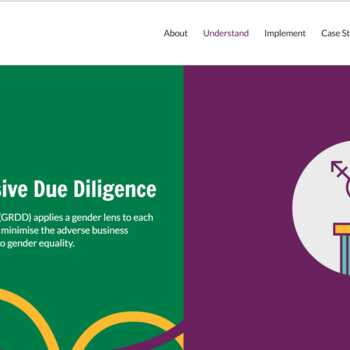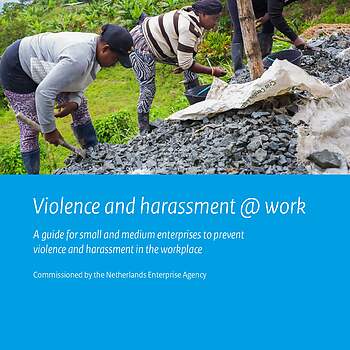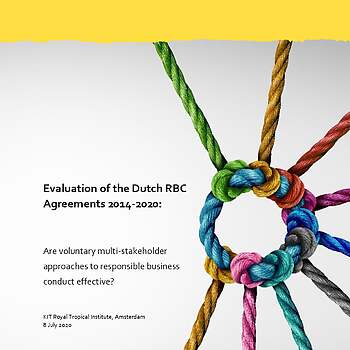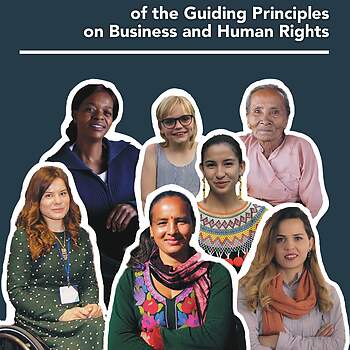International lobby for Responsible Business Conduct
Since around 2000, the role of the private sector in global development raised concerns among various stakeholders. The increasing globalization meant that the impact of large companies on the lives of the poor steadily increased, and not always to the benefit of the poor. The concerns extended over a range of social and environmental issues, among which gender issues. For instance, in sectors with large female workforces (garments, tea, flowers) a ‘race to the bottom’ was taking place. Brands and factories competed to produce against the lowest possible costs, by lowering wages and working conditions for employees. The Rana Plaza factory collapse in Dhaka was an extreme case of widespread unsafe working conditions. In other sectors such as mining, forestry and agricultural commodities, the living environments of women were severely threatened. A comprehensive analysis of the links between trade and gender was made by the UN organization for Trade and Development UNCTAD.
Terminology: The concerns on the role of the private sector have been addressed through various strategies. In the private sector, the concerns were often addressed under the heading of Corporate Social Responsibility (CSR). This term was also used by the EU in its 2011 renewed strategy for CSR. The OECD introduced, in close cooperation with business, trade unions and non-governmental organizations, the concept of Responsible Business Conduct (RBC). Within the UN, these issues are addressed by the Human Rights Council under the heading of Business and Human Rights. The various terms reflect different approaches and evolving concepts. However, they are largely aligned on the goals that they pursue. The Dutch MFA uses the Dutch term of ‘Internationaal Maatschappelijk Verantwoord Ondernemen’ (IMVO), which largely corresponds with Responsible Business Conduct.
The increased awareness of the potential negative impact of private sector operations, led to a call for more responsible business conduct. The UN responded by requesting Harvard professor Ruggie to develop principles for respect of human rights in international trade. The three ‘Ruggie principles’ of protect, respect and remedy provide the basis for the work on responsible business conduct. The principles hold that states are to protect human rights, companies are to respect human rights, and victims are to be given access to remedy. In 2011 the UN Guiding Principles for Business and Human Rights were endorsed. The OECD followed by updating its Guidelines for Multinational Enterprises in 2011.
RBC in Dutch trade policy
In the Netherlands, the portfolios of development cooperation (‘aid’) and trade had been merged in 2013. Minister Ploumen took up the challenge of responsible business conduct in foreign trade (IMVO in the Dutch abbreviation). At the request of MFA, the advisory firm KPMG took stock of the human rights issues in the main international sectors of the Dutch economy.
In April 2014 the Dutch Social and Economic Council (SER) had already recommended to work towards RBC agreements that would promote international responsible business conduct in sectors. The agreements would engage businesses, trade associations, government, trade unions and NGOs. On the basis of the SER and KPMG reports, MFA facilitated negotiations with stakeholders per sector. Twelve RBC Agreements have been concluded since 2014. Seven had ended by the end of 2022.
Integrating gender issues in RBC Agreements proved challenging
Gender issues were only included in the KPMG study after a successful lobby by the Dutch Gender Platform WO=MEN, with help of MFA’s Task Force on Women’s Rights and Gender Equality (TFVG). Expert members of the WO=MEN network, often NGOs engaged in sustainable value chain development, provided information. As a result, the 2014 KPMG report listed women’s rights as a risk factor in several sectors.
Yet, gender issues were not well integrated in the RBC Agreements, in spite of efforts of civil society negotiators. An evaluation in 2020 concluded that only three Agreements had identified women’s rights or gender equality as a cross-cutting concern (floriculture, garments & textile and natural stone), but even then these concerns were not prioritized for action. Lack of awareness of gender issues on the part of businesses played a role here, as well as capacity constraints of civil society participants.
Comparable challenges were encountered in mainstreaming gender in RBC at the international level. In an effort to better equip partners, the UN published the tool Gender Dimensions of the UN Guiding Principles on Business and Human Rights in 2019.
MFA supported the RBC Agreements process by funding the development of a web-based platform on gender-responsive due diligence. This platform not only provides concrete guidance on steps to be taken by companies and other stakeholders, but also offers links to a wealth of publications on WEE in an international business context.
The lobby for a binding legislation
An important factor limiting the success of the RBC Agreements was their voluntary character, and the small proportion of businesses that signed up. Internationally, the limitations of relying on voluntary compliance had already led to a lobby for binding legislation at various levels. At the UN level, negotiations on a new Binding Treaty on Business and Human Rights have been ongoing since 2014. The process still continues when writing this text (February 2023), and it is not certain that a Treaty will be concluded in the end. At the EU level, the EU builds on its 2011 renewed strategy for CSR. The EU is working on a Directive on corporate sustainability due diligence. In the Netherlands, MFA committed to promote EU legislation on RBC and introduce national legislation as well, see its policy note on development cooperation and trade. However, an initiative proposal for law on RBC, submitted by six political parties in the parliament, was rejected by the government. The proposed law led to fierce resistance from the private sector. The MVO Platform, a network of Dutch civil society organizations and trade unions, continues the lobby for Dutch national legislation (early 2023).





